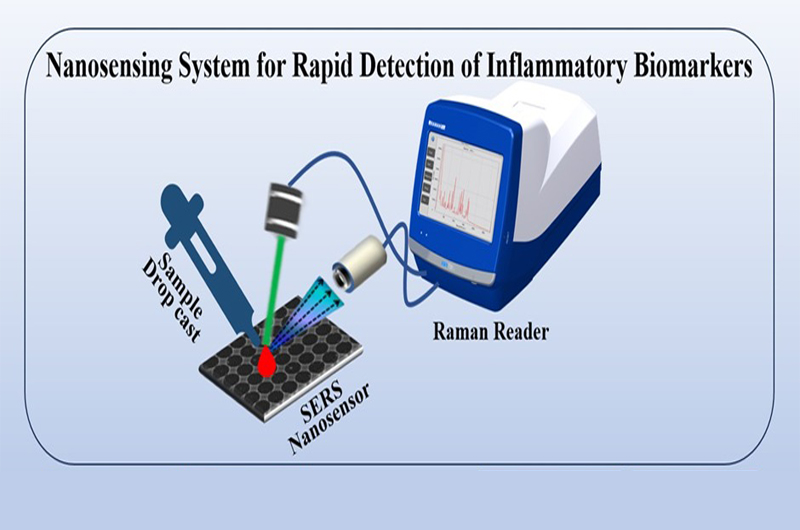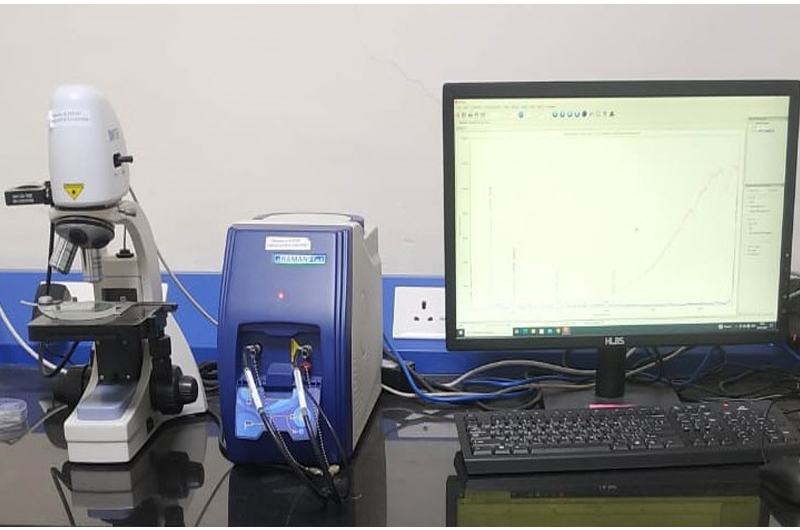The new equipment not only cuts diagnosis time considerably, it holds out hope for decreased mortality from terminal illnesses like cancer because of the capability of detecting early warning signs. Rina Mukherji has the details
Researchers at the Indian Institute of Technology (IIT), Jodhpur, have developed a nano-sensor that helps in the quick detection of cytokines, a group of proteins that are the bio-markers of inflammation and are used for diagnosing diseases and tracking their progress. This sensor is based on semiconductor process technology that works on the principle of Surface Enhanced Raman Scattering (SERS).

Cytokines play an important role in tissue damage repair, cancer development and progression, and modulating immune reactions. This is why they are important for developing precision medicine and targeted therapeutics for various conditions like cancer and rheumatism. This development can, therefore, reduce mortality by preventing delayed diagnosis and giving early warning. The technology can also be used for health monitoring, disease diagnosis, prognosis, and immune response tracking.
Research on this technique was undertaken by Prof Ajay Agarwal, head, Department of Electrical Engineering, Prof Sushmita Jha, Department of Bioscience and Bioengineering, B Akilandeshwari, Department of Bioscience and Bioengineering, and Sarvar Singh, Department of Electrical Engineering. The work done was published as a paper presented at the 2023 IEEE Applied Sensing Conference (https://doi.org/10.1109/APSCON56343.2023.10101191).
Elaborating on the nano-sensor developed, Prof Ajay Agarwal said the technique had shown encouraging results with three biomarkers, namely,interleukin-6 (IL-6), interleukin-β (IL-β), and TNF-α – which are key pro-inflammatory cytokines, released by inflammatory cells.As of now, work remains confined to controlled samples, although clinical trials are to commence soon. The team intends to use the technique to develop protocols for early-stage diagnosis of sepsis and fungal infections.
Currently, cytokine detection is done using the enzyme-linked immunosorbent assay (ELISA) test and polymerase chain reaction (PCR). Although reliable, these methods are highly time-consuming, with analysis taking over six hours. The newly developed technique, on the other hand, takes just 30 minutes, is highly cost-effective, and is used in conjunction with artificial intelligence for quick and accurate data processing and analysis.
71 per cent survival rate noted for haemodialysis
A nationwide study by the George Institute for Global Health on patients undergoing haemodialysis has revealed that 71 per cent, or 7 out of 10 persons undergoing this treatment, survive for over 6 months. The model also predicted an 83-97 per cent 180-day survival rate.
Haemodialysis is a vital medical procedure used to treat individuals with kidney failure. It is resorted to when the kidneys are unable to effectively filter waste and excess fluid from the blood.
According to an article in The Lancet, the study used individual-level data from 193 dialysis centres across India, evaluating a cohort of 23,601 patients from April 2014 to June 2019. According to the findings, patient mortality was 32 per cent higher in rural centres as compared to urban centres. Mortality was also found to be lower among people with higher income and education and among those who did not have to pay for their treatment. On the other hand, higher mortality was seen in patients who were diabetic, and whose vascular access was anything other than an arteriovenous fistula or graft.
India has one of the highest numbers of long-term dialysis patients globally. The figure was estimated to be 175,000 s in 2018 and the numbers are rising. Amongst all procedures covered under the Ayushman Bharat Scheme, the government spends the most money on dialysis procedures. Despite this burden, there has been limited data on the clinical outcomes of dialysis patients in India. Previous studies were either small, single-centre, or over a decade old. The study is important because earlier there was no national survival benchmark for haemodialysis patients, and neither had any comparative examination been undertaken on differences in survival rates among dialysis centres.
Although the National Dialysis Programme and subsidies by state governments have improved access to dialysis in the country, long-term management of complications associated with dialysis, such as cardiovascular disease and mineral bone disease remains wanting. The Geoge Institute of Global Health has been urging the government to link up a dialysis registry with the national dialysis programme.
Reference: https://www.thelancet.com/journals/lansea/article/PIIS2772-3682(24)00033-7/fulltext
IIT(G) comes up with swine fever vaccine technology
The Indian Institute of Technology (IIT) Guwahati, has successfully transferred a recombinant vector vaccine technology for swine fever to Biomed Pvt Ltd for the manufacture of a vaccine for pigs. Swine fever, normally referred to as classical swine fever (CSF), is a highly contagious disease that poses a severe threat to pigs in breeding farms. Instances of swine fever are frequently seen in the north-eastern states, besides Bihar, Kerala, Punjab Haryana and Gujarat. The swine fever virus is seen in both pigs and wild boars, though it does not affect humans. In 1997-98, a CSF outbreak caused huge economic losses in the Netherlands. There have also been outbreaks in several other European countries. Generally, piglets are more susceptible to the disease, as compared to adults. Currently, there is no vaccine available to combat this disease.
Work on this veterinary vaccine was started in 2018-19 through collaboration among researchers at the Department of Biosciences and Bioengineering at IIT Guwahati, and the Assam Agricultural University. The findings from the study have been published in two journals – Process Biochemistry and the Archives of Virology.
References:
https://doi.org/10.1016/j.procbio.2017.12.001
https://doi.org/10.1007/s00705-019-04425-4
(The writer is a senior freelance journalist based in Pune.)



 from Webdoux
from Webdoux